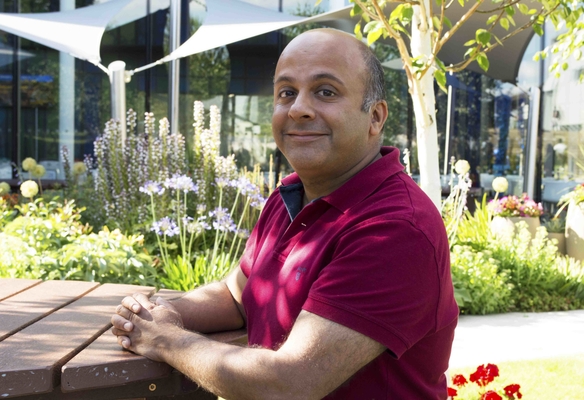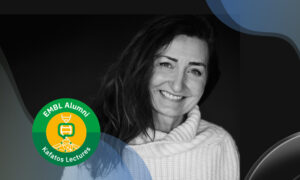
Welcome: Zamin Iqbal
New EMBL-EBI group leader Zamin Iqbal is developing computational methods for understanding genetic variation in microbes and developing diagnostic tools for antimicrobial resistance

The Iqbal group works on a range of problems related to genetic variation in microbes. One core project involves analysing 100,000 tuberculosis (TB) genomes as part of a consortium seeking to find the genetic underpinnings of drug resistance. The results feed directly into the group’s work on TB diagnostics: they recently demonstrated that one could go from a patient’s sputum to a full diagnostic test for TB including drug resistance prediction, in just 12.5 hours.
With funding from the Longitude Prize they, with collaborators at Oxford University, will soon test the feasibility of using their same-day TB test in healthcare settings in Mumbai and Ho Chi Minh City.
Another major goal is to build a ‘Google of bacteria’ that will enable doctors to compare a sample from a patient to a repository of all bacteria that have ever been sequenced, so that they can better interpret the genome. Underlying all of these are computational models, combining ideas of how evolution works and new developments in computer science.
In the next two decades, we will probably be able to tell from a blood sample what infections a patient has had in their life
Tell me a little bit about yourself
I was a mathematician once upon a time. I got my degree from Cambridge and then went on to do a PhD at Oxford. At the end of my PhD, I decided I wanted to do something different, so I joined a company writing software for mobile phones. In fact, I worked on the first Nokia phone that had a camera on it. Moving out of academia was a valuable experience – I discovered abilities I never knew I had; for example, it was a chance to coordinate large groups and projects.
However, I missed the creativity of science, and spent some time trying to work out what I wanted. This included moving to Seville for a year, playing flamenco guitar – really a great life experience and something I look back on fondly.
In 2008, I got a job at EMBL-EBI, working with Paul Flicek on the 1000 Genomes project. This is where I got to grips with bioinformatics and learned about genome assembly and mapping. I then went on to do a postdoc at Oxford, where I later became a group leader. My group there nucleated some of the problems I now focus on at EMBL-EBI – surface antigens in P. falciparum, the parasite responsible for malaria, and antibiotic resistance prediction from genomic data.
And now I’m back at EMBL-EBI as a group leader; it’s been an interesting and enjoyable journey and I’m very excited about what the next few years hold.
What are your scientific interests?
I would like to understand how genomes change and particularly how that relates to infectious diseases. I think in the next two decades, we will probably be able to tell from a blood sample what infections a patient has had in their life.
The nice thing about what we do is combining our different backgrounds to succeed
What is this longitude award all about?
While I was at Oxford, my group worked with Derrick Crook’s lab at the John Radcliffe Hospital, developing a TB test that works in less than 24 hours, which is a huge advance over previous methods that took weeks. Patients with TB can’t usually afford to wait around for weeks for their results to come in – particularly when they live in remote areas and have to travel a long way to the clinic. We’re aiming for a 30-minute test that anyone could run easily – this is an important issue for global health.
This prize supports our work to test the feasibility of using handheld sequencing devices like Nanopore’s MinION in healthcare settings in Vietnam and India, to see if we can identify pragmatic challenges of rolling the technology out to the clinic. But it’s not just about the technology – it’s whether there are obstacles with shipment, temperature, infrastructure, training, etc. We want to make the tests more robust and cheaper, with a view to setting up a clinical trial.
What is your philosophy for running a lab?
There’s always a temptation to be the first to do something, which means that working in science can feel like a race in which the first scientist to learn something new gets rewarded. I don’t think this is always the best approach. It’s often more important to step back and challenge how people think about things; it’s almost like checking that you’re running in the right direction before you start.
In terms of group philosophy, I like things to be quite informal. Similarly, I would like to see people help each other instead of competing against each other. The nice thing about what we do is combining our different backgrounds to succeed.
What kind of skills are you looking for in your group?
Quantitative skills, programming skills and an interest in biology.
Working in bioinformatics means you also need to be comfortable with failure. The process of understanding things involves that initial stage of not understanding, which can be very frustrating. However, a good scientist learns to deal with failure in a creative and productive way instead of getting bogged down by it.
A good scientist learns to deal with failure in a creative and productive way
Name one tool you can’t do without
BLAST, the genome browser from NCBI and EMBL-EBI. Researchers can use it to compare their data to all publicly available genomes. As a scientist, you end up going back to it over and over again. The web services come in handy as well.
What’s the best advice you’ve ever received?
Moderation in everything. It’s hard to find the right balance, especially if you’re passionate about what you do, but it’s the best approach in the long run. The last thing you want is to burn out.
What has struck you at EMBL-EBI since you joined?
It’s very collegial, everyone tries to help each other and keep everyone informed about what they’re doing. There is also a lot of support for early career researchers, so it’s a great place to try out your most daring scientific ideas.
Which unresolved question would you most like to answer?
I’d like to explore some of the weird things that happen in biology.
For example, the Plasmodium parasite causes malaria. A mosquito bites you, the bug goes into your liver, comes out a different shape before going into blood cells where it explodes and quickly infects the individual. Plasmodium has certain genes (MSP3.4 and MSP3.8) that exist in two different versions, meaning it has two different lineages. You see both versions everywhere in the world.
This behaviour doesn’t make sense unless natural selection is getting involved – having two “versions” (alleles) of a gene sitting in parallel like that all over the world means there is some underlying reason and we have no idea what it is. I would love to know what that’s all about.
What would you like to achieve at EMBL-EBI?
I would like to make big steps towards creating a global surveillance platform for monitoring tuberculosis infection. I would also like to have at least one or two examples where people are using this platform in the field. Hopefully we’ll be able to kick off some of these projects this year.
I would like to make big steps towards creating a global surveillance platform for monitoring tuberculosis
There are many technical challenges for creating the platform, but I believe they can be overcome. One of the big hurdles is making the platform useful in real life. For example, in India, some people with tuberculosis see a doctor or someone who claims to be a doctor. Just as many see a pharmacist and the remainder never see any medical practitioners. So even if we can come up with cheap tools for diagnosis, getting people to use them will be challenging.
I can see a lot of barriers, but I am hopeful that we can overcome them.
This post was originally published on EMBL-EBI.


